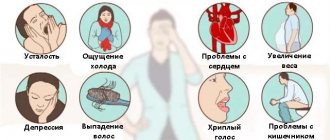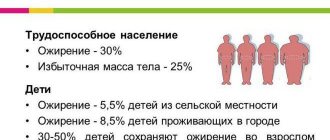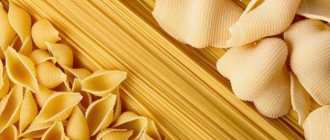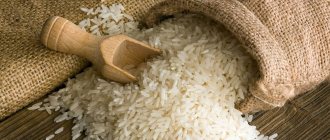Thyroid dysfunction as a cause of weight gain
Not everyone knows that thyroid dysfunction is one of the main causes of weight gain. To be more precise, the reason lies in the insufficient production of hormones by this gland, resulting in a slowdown in metabolic processes. As a result, carbohydrates are not completely absorbed, but are stored as fat reserves.
Lack of iodine affects thyroid function; it is iodine that converts calories into energy, not fat. The main weight gain is carried out due to thyroid-stimulating hormone (TSH), which regulates the production of two thyroid hormones: triiodothyronine (T3) and thyroxine (T4). It is these essential substances that regulate the processes of energy formation in the body.
As a result of hormonal imbalance, tissues fill with fluid, this process is called hydrophilicity. As a result, fat deposition occurs. In order to know for sure that excess weight gain is caused by a malfunction of the thyroid gland, you need to undergo laboratory tests and obtain a doctor’s opinion. Only after this can treatment begin.
We would like to draw readers' attention to the importance of metabolic processes . It is because of metabolic failure that obesity develops. With hypothyroidism, kilograms quickly accumulate, causing moral and physical harm to a person. But if you monitor your thyroid gland and prevent disruptions in its functioning, you can avoid the problem of excess weight, which is very difficult to solve.
What is hypothyroidism?
Hypothyroidism is an acute deficiency of the thyroid gland. A person gains weight sharply due to metabolic disorders and hormone deficiency.
A number of other symptoms gradually appear:
- slowing down metabolism;
- loss of eyelashes, eyebrows, hair;
- breast swelling;
- massiveness of the lower body;
- decreased reproductive functions;
- impaired memory, concentration;
- increased cholesterol levels.
Women begin to suffer from irregular menstrual cycles, men from erectile dysfunction. Hypothyroidism develops slowly, but in case of complications it can cause cardiovascular failure and coma.
In case of hypothyroidism, it is first necessary to find out and eliminate the provoking factors. Diet also plays a special role.
How does hypothyroidism occur?
Most often, the body responds with increased weight to a lack of iodine, and iodine deficiency is a manifestation of hypothyroidism. Hypothyroidism is the most common type of thyroid disorder. This is a form of pathology in which there is a lack of production of thyroid hormones . Let's look at how hypothyroidism occurs.
As we said above, thyroid-stimulating hormone or TSH controls the production of triiodothyronine (T3) and thyroxine (T4). If the thyroid gland stops producing them in the required volumes, a disease called hypothyroidism occurs. Note that there is a close connection between these three substances. If at least one of them ceases to be synthesized in the required volumes, the entire endocrine system immediately begins to suffer. With age, TSH levels begin to fall, in addition, its amount decreases with a pituitary tumor.
To understand which hormone is missing in the body, you first need to take a blood test. Endocrinologists, by the way, write out a referral for both tests at once, since the mechanism of operation of these hormones is interconnected.
In fact, a violation in their interaction is one of the reasons for excess weight in a person. The second reason is the pathology of the thyroid gland itself, caused by a number of reasons: taking medications, surgical interventions, radioactive exposure, etc.
Thyroid medications for weight loss
With an integrated approach to treatment, doctors prescribe hormone replacement therapy.
The most vital medications for hypothyroidism:
- L-carnitine;
- Thyroxine;
- Euthyrox;
- Omega 3;
- levothyroxine sodium.
Before treatment, patients undergo a blood test to determine the levels of cortisone, thyroxine, triiodothyronine, and TSH in the plasma. Only based on the results obtained, the doctor prescribes effective medications according to indications.
Main manifestations of hypothyroidism
Speaking about problems with the thyroid gland, we should name the main manifestations of hypothyroidism. So, patients with a lack of the hormone T4 experience the following symptoms:
- decreased performance;
- slowing down energy processes;
- decreased attention and hearing;
- weight gain;
- slow heartbeat;
- manifestation of dry skin;
- constant feeling of cold;
- brittle nails are observed;
- hair loss;
- disruptions in the functioning of the gastrointestinal tract have been noticed;
- liver enlargement;
- metabolic disease.
In addition, frequent companions of this disease: swelling of the limbs and face, muscle weakness, headaches.
Hypothyroidism also harms a person’s psychological state. Interest in the environment disappears, passivity and a constant desire for rest arise. In the female half, the reproductive functions of the body are disrupted, the cycle is disrupted, and problems arise with conception. Puffiness of the face and bulging of the eyeballs appear.
Purgation
It is reasonable to start losing weight if you have a thyroid gland or its reduced function with bowel cleansing. Since metabolic processes are reduced in this condition, food travels too long before leaving the body.
Often such patients have potassium stones in the intestines - dense compactions of stool. Liquid feces “washes” these clots, and potassium stones remain in their places, poisoning the person.
If you are prone to constipation (you don’t have bowel movements every day), start with a thorough cleansing of your intestines. For example, you can use an inexpensive and effective remedy - Epsom salts (magnesia powder).
A one-time use is usually enough to cleanse the intestines: a bag of magnesia is dissolved in a glass of water and drunk in one go (it is quite unpleasant, you can “snack” with lemon). It is possible to repeat the cleaning after a month.
A few words about where the thyroid gland is located. Thyroid functions
The thyroid gland is an endocrine gland that is responsible for the normal functioning of the entire body. The thyroid gland is located in the neck, under the larynx, covering the trachea. It looks like a butterfly or a shield. This important organ weighs only 12-25 grams, but is of great importance for humans. So, let's look at the functions of the thyroid gland.
The most important task of our small but very important gland is to fill the body with thyroid hormones T3 - triiodothyronine and T4 - thyroxine. These hormones are responsible for filling cells with oxygen, for the functioning of muscles, the musculoskeletal system, the heart, and the brain. The production of these hormones affects: human growth, psychological state, metabolism, puberty, childbirth, formation and gestation of the fetus, digestive system, circulatory system, immune system, weight, energy metabolism, body temperature.
How to lose weight if you don’t have a thyroid gland: diet, weight loss products
The thyroid gland is a very important organ. Its functions are the production of hormones - thyroxine and triiodothyronine. They are necessary for normal metabolism, maintaining immunity, and preventing early aging of the body.
It’s good when the above organ works normally, and people do not have problems with excess weight and well-being. But often the thyroid gland is affected by such ailments as:
- Graves' disease;
- ZOB (large sizes);
- nodular formations;
- malignant tumor.
Severe injuries may also be an indication for surgery.
Typically, thyroid cancer is treated by completely removing it. If nodular formations are very widespread or the goiter is large, doctors also insist on amputating this organ.
So to speak, no gland - no problem. Everything would be fine, but without it the metabolism slows down greatly, and many patients complain that they cannot lose weight, and their health cannot be called excellent.
It turns out that there are still problems and they need to be eliminated.
Ways to lose weight
There is already an established opinion among people that after removal of the thyroid gland it is impossible to lose weight; the weight is only gained, but not lost. In addition, swelling of the body appears, which further aggravates the situation. It's actually not all that bad.
After surgery, you should be constantly monitored by an endocrinologist. If hormones are normal, then you can do without taking medications, but in order not to gain weight, you should still follow a gentle diet and lead an active lifestyle.
And yet, after removal of the thyroid gland, a person is not disabled, and therefore physical exercise is not prohibited. You only need to abstain from them for the first six months. Later, you should combine:
- taking medications;
- diet;
- sport.
It is worth knowing that the removal of the thyroid gland and weight loss are two compatible concepts, they are not someone’s ridiculous invention and this is the opinion of experienced endocrinologists. If you maintain your health and monitor your diet, you can forget about excess weight forever. But let's talk about all the methods in order.
Hormonal drugs
After surgery on the thyroid gland, doctors often prescribe medications that speed up metabolism, namely these:
- hormone substitutes;
- L-thyroxine.
It is this hormone that is responsible for regulating:
- carbohydrate;
- protein;
- fat metabolism;
- weight loss.
The drug is available in tablets of 50 and 100 mcg. The daily dose for an adult is 1.5-2 tablets. The effect of the drug lasts another week after stopping use.
Eutroxin
Both drugs have many contraindications:
- adrenal diseases;
- insufficient production of pituitary hormones;
- myocardial infarction;
- thyrotoxicosis;
- myocarditis;
- pancarditis;
- galactose intolerance;
- intolerance to the auxiliary components of the drug.
In the absence of contraindications, infants and people of retirement age can take the drug. The dosage for both is determined by the attending physician. The effect of taking it is noticeable within a week.
Diet
Sometimes, despite the use of hormones, weight loss may not occur for a long time. As a rule, this is due to the fact that a person eats the food that everyone is used to calling tasty.
Unfortunately, this food is not healthy.
In order to speed up your metabolism, you should eat small portions at least five times a day, enrich your menu with foods high in iodine, and also exclude:
- chocolate;
- smoked meats;
- fried foods;
- sugar;
- alcoholic drinks;
- carbonated drinks;
- strong tea;
- cocoa;
- coffee.
Limit consumption:
- meat;
- salt;
- oils;
- spicy foods;
- dairy products;
- soy products;
- flour products.
You can use without restrictions:
- fish and seafood;
- vegetables (preferably raw);
- fruits;
- porridge.
This is what the menu looks like for someone who has had their thyroid gland removed.
Breakfast - two bread sandwiches with red fish and herbs (arugula, iceberg lettuce), any juice or green tea.
Afternoon snack – one banana, a glass of low-fat kefir.
Lunch – vegetable soup, Greek salad (bell peppers, olives, Feta cheese, tomatoes, cucumbers), seasoned with olive oil and lemon juice, rice bread 3 pcs.
Dinner – rice with shrimp and peas, weak tea, or better yet: a lemon-ginger drink.
Second dinner - one boiled egg, bread, apple.
Between meals, it is recommended to drink water and other permitted drinks, but not more than one liter per day. Violation of this rule is fraught with swelling.
Once a week it is necessary to spend a fasting day (on one of the cleansing products). Strict diets and prolonged fasting are strictly contraindicated.
If you follow all the above rules, the excess weight will go away very quickly and will never appear again.
Sport exercises
Playing sports and other physical activities will help you lose weight even faster if your thyroid gland is removed, as they help burn calories. It's funny when people talk about the ineffectiveness of this method.
After all, it can’t be that a person runs all the time and doesn’t burn calories.
If this happens, then most likely, after exercise, appetite increases and people replenish their fat reserves in excess or consume a lot of fluid and the body swells.
What is suitable for patients to lose weight? The first thing you should pay attention to is:
- walking at least 2-3 hours a day;
- a ride on the bicycle;
- jogging;
- Weightlifting;
- figure skating;
- dancing;
- sprinting;
- classes in gyms.
Everything would be fine, but, unfortunately, some people are forced to work (14-15 hours a day) in order to ensure their existence and they have no time to go for walks, visit the skating rink, gym and other sports activities.
There are home exercises for them:
- stretching;
- squats;
- Abs swing.
Set of exercises
Exercise No. 1
- Get on all fours;
- legs should be straight (not on your knees);
- sit down;
- rise.
On topic: Interval walking for weight loss
Repeat 10-15 times.
Exercise No. 2
- Lie down on the floor;
- straighten your legs;
- turn to one side;
- raise your leg 20 times.
Turn over to the other side and repeat the same with the other leg.
Exercise #3
- Stretch your arms forward;
- bend your elbows;
- press your palms tightly together and hold them at chest level;
- clench your palms so that the muscles of your arms and chest tense.
Repeat 15 times.
Exercise #4
- stand up straight;
- clasp your hands behind your back;
- straighten your arms;
- tilt in one direction or the other.
Repeat 10 times.
It should be noted that housework such as:
- cleaning;
- washing dishes;
- ironing;
- washing (manually);
- rearrangement of furniture.
also helps burn excess calories.
Conclusion
Failure to follow doctor's recommendations often leads to obesity and other related diseases. Among them:
- heart failure;
- renal failure;
- liver diseases;
- Gastrointestinal tract.
Source: https://OGormone.ru/bolezni/shitovidnay-zheleza/kak-pohudet-esli-net-shhitovidki.html
Hypothyroidism: disease statistics
It is worth talking a little about the statistics of hypothyroidism. Every year the number of cases increases by 5%. Moreover, women are exposed to this pathology 7 to 9 times more often than men. The total number of patients with this disease in the world is about 700 million people, and one and a half million are at risk.
In Russia, from 15 to 40 percent of the country's population suffer from hypothyroidism, in some regions the figure reaches almost 100 percent. In the United States, statistics on the development of thyroid pathology indicate that 27 million people have hypothyroidism. A study was conducted in Ukraine: out of 50 thousand people, almost half had thyroid disorders. In fact, the figures are much higher, since many do not even suspect that they have this disease.
Why is this happening? In 70 percent of Russian territories there is not enough iodine not only in the soil, but also in the water. This problem is becoming more and more urgent.
Thyroid extract preparations and other “medicines” for weight loss
Thyroid extract preparations and other “medicines” for weight loss
- 0.00 / 5 5
The first mention of weight loss pills appeared in Dr. Fleming's guide to weight loss, which dates back to 1760. The pundit recommended fighting obesity with laxatives and diuretics. It’s clear that using these methods to get rid of excess weight is not difficult, but they have absolutely no effect on body fat.
What’s amazing is that Dr. Fleming’s methods are still alive in the form of herbal teas for weight loss. Those who think that this is a completely safe way to lose weight should know that with intensive use of diuretics, electrolytes are removed from the body along with fluid, which leads to heart rhythm disturbances. And this is already fraught with serious consequences, including death.
In 1892, the first drug appeared that could truly be called a cure for obesity. True, only at first it seemed like a brilliant discovery, and then they tried to forget about the miracle remedy as quickly as possible. What's the matter? The fault lies with the excessive observation of doctors who noticed that patients with Graves' disease do not gain weight.
Attention!
Having begun to understand the reasons, the doctor suggested that the goiter that occurs as a result of the disease produces a certain substance that prevents a person from getting better, and they decided to use the extract from the goiter as a means of losing weight.
By the way, the assumption about a certain substance was confirmed already in the twentieth century - indeed, the diseased gland begins to produce thyroid hormones in excess, causing thyrotoxicosis.
To the horror of patients, drugs with an extract from the thyroid gland not only helped to lose weight, but also fully provided all the other symptoms of thyrotoxicosis.
Along with fat burning, bulging eyes, sudden mood swings, rapid heartbeat and trembling in the body appeared. Very often, such treatment of obesity ended in arrhythmia.
Despite such terrible side effects, an official ban on the use of such drugs, for example, in the United States appeared only in the 80s of the twentieth century, when they already looked like an obvious anachronism.
Another medicine for weight loss, “seen” not in the healthiest conditions, is a drug with dinitrophenol, released in 1934. Pharmacists discovered this “miracle drug” at enterprises producing aniline dyes, which themselves belong to hazardous industries. The workers of such workshops were distinguished by their enviable slimness.
Since registration of drugs a hundred years ago was much simpler than it is now, the launch of dinitrophenol-containing drugs occurred very quickly.
Fortunately, doctors were able to ruin the health of patients with the new product only for four years, during which a whole bunch of side effects were identified: cataracts, neuropathy (nerve damage), and skin damage.
Important!
And in 1947, they tried to adapt such a well-known drug as amphetamine to combat obesity. In addition to obesity, it was also used to treat a runny nose, which was explained very simply - the drug reduced swelling in the nasopharynx and dulled the feeling of hunger. And besides this, it caused euphoria and drug addiction.
By the way, during World War II it was even included as a doping agent in army first aid kits. A little more than 10 years later, two more drugs with similar effects were registered in the same United States - diethylpropion and phentermine. And they also began to treat obesity with such a remedy for the runny nose as FPA.
All of these drugs belong to the same group, their mechanism of action is similar to that of amphetamine, and all of them are equally successful in causing drug addiction. By the way, the FPA managed to reach even the Soviet Union in the early 90s.
Today, only phentermine and diethylpropion remain on the list of approved drugs, which can only be taken in very short courses.
The 70s of the twentieth century in Europe became the real era of the French drug fenfluramine. In the fight against extra pounds, many people took it, including in the vastness of the former USSR.
The drug even reached the States, where it was combined with phentermine, releasing a new drug, fen-phen.
However, the “French project” collapsed quite quickly - it was proven that the drug causes irreversible damage to the heart valve, which necessitated surgical intervention. In 1997, fenfluramine was phased out worldwide.
But, as they say, a holy place is never empty, and now, instead of French fenfluramine, the whole world is fighting excess weight with the help of American meridia.
Advice!
True, several years ago the manufacturer voluntarily abandoned the production of this drug, since the latter seriously increased the risk of strokes and heart attacks.
In our pharmacies, however, you can still find analogues of this remedy.
Another trendy drug from the latest developments, which turned out to be not as harmless as we would like, is the Swiss xenical.
They first started talking about it in 1999, and at first everything seemed to be just fine - the medicine did not allow the body to absorb fats, which were then excreted in the stool.
Apart from mild diarrhea, the patient did not seem to have any problems. But suddenly, meticulous researchers discovered that Xenical could have a detrimental effect on the liver.
And here is another new product - lorcaserin, which is close in action to meridia and fenfluramine. So far, the general public is not aware of the negative side effects of the new drug. But whether this situation will continue in the future, only time will tell.
Thyroid extract preparations and other “medicines” for weight loss
- 0.00 / 5 5
Source: https://thyro.info/preparaty-s-vy-tyazhkoj-iz-shhitovidnoj-zhelezy-i-drugie-lekarstva-dlya-pohudeniya/
Nutrition for hypothyroidism
According to the recommendations of the World Health Organization, a person should consume at least 150 - 200 mcg of iodine per day. In fact, the Russian population consumes two to three times less of this valuable mineral. As a result, this leads to severe pathologies. Therefore, nutrition for hypothyroidism and for its prevention should contain iodine.
For example, children under one year old need about 90 mcg of iodine per day for full development; from two to five years - 110 - 130 mcg; over 7 years old - it is necessary to increase the dose from 130 to 150 per day; starting from 12 years of age, the norm is 150 - 200 mcg.
Pregnant and lactating women should increase their daily iodine dose to approximately 300 mcg. But it should be remembered that an excess of a mineral, just like a deficiency, is harmful to the body.
We all know that a healthy diet is the key to a long and fulfilling life, and with hypothyroidism this statement is doubly true. The human body has all the protective mechanisms to counter the influence of unfavorable external and internal signs. The thyroid gland is our guardian, which controls immune processes in the body. It must be protected from violations. Armed with knowledge about hyperthyroidism, you can confidently confront it. One of the most important points is proper nutrition.
It is recommended to eat 5 - 6 times a day in small quantities. This helps the digestive system absorb nutrients and vitamins. It is important that the food is warm. Not everyone knows that the body spends a lot of energy digesting cold or hot food, and with hypothyroidism this worsens the tendency to recover .
An important factor for normalizing the condition of the thyroid gland is the presence of ascorbic acid in the diet. It strengthens the walls of blood vessels well, thereby eliminating swelling.
What to do
First of all, don't panic. Hypothyroidism is a serious diagnosis, but not a sentence to remain fat. Losing weight with hypothyroidism is difficult, but possible. Just don't even try to do it yourself! The weight loss process must be carefully planned and carried out under the supervision of endocrinologists.
Establishing diagnosis
It is very important to establish the diagnosis as accurately as possible. And to do this without ultrasound diagnostics and laboratory tests that accurately determine the level of the hormones T4 and TSH in the blood is unrealistic.
Therefore, even if you know for sure that you have hypothyroidism, go for a re-examination before starting to lose weight. Perhaps something has changed since diagnosis.
Many patients are hysterically afraid of taking hormonal medications, the prescription of which for hypothyroidism is almost inevitable. Therefore, they ask the doctor to cancel them (or do it themselves) as soon as TSH drops to 5 units. (at a norm of 0.5-5). But this is not recovery, but only the upper limit of the norm! If your TSH is above 2.5-3, be sure to consult your doctor: most likely you need to continue taking the drug.
It is equally important to know that there are no organic disorders in the thyroid gland itself: inflammatory processes, abscesses, neoplasms, etc. If there are any, then you must first eliminate the main problem, and then purposefully engage in weight loss.
Also make sure that other medications you may be taking do not reduce the effectiveness of L-thyroxine. Most often these are drugs or multivitamin complexes with large amounts of calcium.
Birth control pills also change hormonal levels, so when choosing them, be sure to inform your gynecologist about the presence of hypothyroidism and find out if you can take them.
Smart nutrition
Any type of fasting is strictly prohibited for patients with hypothyroidism. The only way to lose weight if you have thyroid disease is a healthy, moderate and proper diet. Here are some tips from endocrinologists:
- Watch your calories. Many patients rush from one extreme to another. Trying to quickly lose weight, they sharply limit their daily diet to 900 or even 500 kcal per day. This is strictly forbidden. The easiest way is to calculate the minimum permissible calorie content using the formula derived by endocrinologists: multiply your weight by 25 and subtract 200 from the result. You cannot go below this value! This will slow down your metabolism even more.
- Love seafood. Iodine from them is absorbed much better than from artificially created drugs. And the calorie content of seafood is low, so you can eat it every day (if, of course, your financial capabilities allow it). However, kelp seaweed is available to absolutely everyone. Those who do not like it in the form of a salad can add chopped dried seaweed to prepared dishes, as a regular seasoning.
- Control your appetite. Attacks of brutal appetite in patients with hypothyroidism have two possible causes: “physiological stress” regularly experienced by the body due to hormonal fluctuations and too slow absorption of nutrients. The easiest way to deal with the second is by split meals, when meals are taken approximately 2.5-3 hours later. And breathing exercises and herbal sedatives are great against stress.
- Protein breakfast. Endocrinologists advise patients with hypothyroidism to start the day with protein foods - it saturates the body for longer and allows it to start the new day normally. This could be an omelet, dairy products, fish or meat soufflé. As an alternative, you can have a protein shake for second breakfast if you prefer toast or oatmeal for the first.
- More fiber. It gives you a feeling of fullness for a long time and perfectly cleanses the body. First of all, these are fresh fruits and vegetables. In the absence of exacerbation of gastrointestinal diseases, you can add up to 3 tbsp to the diet. spoons of bran per day. In health food departments you can buy ready-made dietary fiber, which is diluted with water or kefir.
- Less carbs. It is impossible to completely exclude carbohydrates from the diet - this is the main source of energy, without which a person cannot feel cheerful and active. You just need to replace fast carbohydrates with slow ones: choose durum wheat pasta, use unpolished rice. Sprouted grains, which contain a huge amount of vitamins and microelements, are very useful.
It is also inevitable to avoid typical unhealthy foods: sugar, sweets, treats or bags, carbonated and alcoholic drinks. White bread will have to be replaced with whole grain or dark bread, and milk should be chosen with a reduced percentage of fat content.
Physical exercise
Hypothyroidism is not a reason to refuse active physical activity. Another thing is that too intense training for such patients is undesirable. The load should increase gradually and preference should be given to aerobic training - they speed up the fat burning process as much as possible and saturate the body with oxygen.
You yourself will feel when your level of physical fitness increases so much that you want at least a little strength exercise. You need to start with those that use your own body weight: push-ups, planks, various types of squats. And gradually you can add weights.
Building muscle mass is very beneficial. It creates a beautiful body contour and gradually displaces fat. Muscle burns more calories at rest than fat. This means your metabolism speeds up.
For those who do not have the time, energy or opportunity to exercise regularly and for lazy people who do not want to regularly work on themselves, endocrinologists also have some advice:
- Relax actively: walks, hikes, excursions. It's not as boring as working out in the gym, but it's much healthier for the body. Clean air, a positive attitude and new experiences can work wonders.
- Dance! Even if you don't know how to do it. Perhaps it's time to learn and you can go to a dance school. The workload during dance classes is quite comparable to aerobics training. Or just let your body go and move as best you can while listening to your favorite music at home - this will also help relieve stress.
- Take up an active hobby: cycling, rollerblading, horse riding, badminton, skating and skiing - anything for which you are willing to tear yourself away from your couch will do. But it is advisable to exclude extreme sports for now - there is no need to increase the level of stress with hypothyroidism.
- Do your homework. This is especially true for men. Even if you have never vacuumed or washed dishes before, now is the time to start doing it. It is also useful to beat out carpets. This burns as many calories in an hour as half an hour on a treadmill.
- Have sex. Of course, people who are overweight should not try to practice all the Kama Sutra poses. But regular sex perfectly relieves stress, speeds up metabolic processes, and improves immunity. And it’s just nice, and not only for you!
As you can see, even physical education can be fun and exciting. It all depends on your approach and inner mood. Remember that you can enjoy everything in life. And at the same time, lose weight, rejuvenate and gradually get rid of the disease.
Harmful foods for hypothyroidism
Surely, it will be useful for many to learn about harmful foods for hypothyroidism. Basically these are foods that interfere with iodine absorption. Please note that poor nutrition can aggravate the development of the disease. Therefore, a diet for hypothyroidism is an essential part of its treatment. Let's name the foods that you need to exclude from your diet if you have hypothyroidism:
- soy (may inhibit thyroid function).
- broccoli, turnip, mustard;
- fatty meat of animals and poultry;
- full fat milk;
- mushrooms;
- brains, liver, kidneys;
- fish roe;
- alcohol.
Cooking with lard, vegetable oil and butter is contraindicated. It is recommended to steam it so that the food is easily digested. It is also better to replace sweets with dried fruits. Tea or coffee must be brewed weakly, otherwise it can harm metabolic processes. It’s better to replace tea and coffee with natural juices or compotes. You should also limit your intake of fats and carbohydrates.
List of main permitted and prohibited products
Products for hypothyroidism are selected taking into account their calorie content - this is the first rule in any diet. But besides this, the emphasis is on those foods that contain a lot of iodine and tyrosine. Food should also contain a lot of proteins and microelements.
What can you eat?
You can eat anything that is truly healthy. The menu should include seafood, unless you are allergic to it. It is important to monitor bowel function. Patients with thyroid hormone deficiency have a tendency to retain stool, so the diet should contain fiber (fruits, vegetables, cereals). All products should be eaten boiled. This way they retain beneficial substances and make it easier for the body to digest food. With hypothyroidism, this is very important, because digestion also occurs at a slow pace.
The diet for hypothyroidism should include the following foods:
- meat (lean chicken, beef) and offal (cod liver);
- fish (salmon, mackerel, herring);
- eggs;
- low-fat kefir and milk;
- greens, sorrel, garlic, onion;
- vegetable oil;
- low-fat cheeses;
- fruits (bananas, apples, avocados, cherries, kiwi, blueberries, currants);
- dried fruits (dates);
- vegetables (tomatoes, cucumbers, pumpkin, beets, zucchini, bell peppers; eggplants);
- walnuts;
- sesame seeds;
- seaweed;
- bread (bran or bread for diabetics);
- porridge (buckwheat, wheat, rice);
- fruit jelly.
Important! The good news is that if you have hypothyroidism, you can drink coffee, and it’s acceptable to drink several cups a day. The stimulating effect of caffeine on sluggish metabolism and “slow” organs is what you need. Coffee also helps create that desired calorie deficit due to the fact that after a cup of coffee the body is forced to expend energy.
What not to eat
Any diet involves excluding certain foods from the diet. A patient with hypothyroidism should not eat the same foods as a person who has decided to lose weight, that is, all those foods that will lead to the accumulation of excess weight even in a healthy person.
You will have to give up the following products:
- alcohol;
- soda;
- rich and sweet;
- preserves and jams;
- fast food;
- fat meat;
- popcorn and chips;
- smoked meats;
- pickled products;
- pickles;
- everything fried (no crispy crusts);
- oil;
- polished rice
The following products should also be limited:
- fatty cheeses, caviar, butter (contain a lot of cholesterol);
- pasta (difficult to digest with hypothyroidism);
- milk, cottage cheese, sour cream (they contain a lot of calcium, and it has the ability to stimulate damage to thyroid tissue);
- potatoes (you can eat, but little and only boiled)
- salt up to 5 – 6 grams per day (increases swelling).
What should you eat if you have hypothyroidism?
Often the reason for excess weight lies not in overeating, but in hormonal imbalance. And therefore, training and diets will not cope with such a problem. You need proper nutrition with sufficient iodine intake; some vitamin complexes will also be useful. What food is optimal for replenishing our body with iodine?
Mandatory foods that should be included in a person’s diet for hypothyroidism must, of course, be rich in iodine. The best helper in this is variety. You already know about harmful foods for hypothyroidism, and below you can read what you need to eat to stop the development of the disease and the gain of extra pounds. So, we advise you to include the following products in your daily diet:
- seaweed;
- greens, potatoes; carrots, cucumbers, tomatoes;
- seafood;
- fruits;
- cereals, buckwheat porridge;
- chicken eggs (whites only);
- low-fat dairy products and not salty.
Menu for the week, diet table No. 8
Nutrition is developed individually and discussed with a doctor. It is important to take into account the course of the disease and the characteristics of the body.
The diet includes:
- completely eliminate fats and foods high in carbohydrates;
- make protein foods predominant, saturating the body with useful substances.
For thyroid hypothyroidism, table No. 8 is indicated.
Sample menu for 7 days:
- Monday. Breakfast: bread, chamomile tea, avocado. Lunch: boiled buckwheat, vegetable soup, chicken breast. Afternoon snack: sandwich, curd cheese, mango. Dinner: boiled fish, potatoes.
- Tuesday. Breakfast: 2 tomatoes, juice, white scrambled eggs. Lunch: vegetable salad, chicken noodles, bread, juice. Afternoon snack: kefir (1 glass), banana. Dinner: stewed zucchini, seasonal vegetables, minced turkey.
- Wednesday. Breakfast: oatmeal, chamomile tea. Lunch: rice with shrimp, vegetable soup. Afternoon snack: oatmeal cookies (3 pcs.), juice, apple. Dinner: turkey steak, summer salad.
- Thursday. Breakfast: fruit, buckwheat porridge. Lunch: steamed chicken cutlets, greens. Afternoon snack: fish, bread. Dinner: squid, salad, green tea.
- Friday. Breakfast: unsalted cheese for a sandwich, juice, kiwi, green tea. Lunch: barley porridge, summer salad, dried fruit compote, white boiled fish. Afternoon snack: glass of water, feijoa, strawberries, banana shake. Dinner: baked pumpkin with turkey, green tea, rice cake.
- Saturday. Breakfast: boiled eggs (2 pieces), juice, orange, rice cakes. Lunch: seaweed, shrimp with vegetables. Afternoon snack: low-fat kefir (1 glass), nuts. Dinner: chicken cutlets with buckwheat, Greek salad.
- Sunday. Breakfast: a sandwich of bread and unsalted cheese, chicory. Lunch: vegetable soup, bread, green tea, tuna salad. Afternoon snack: fruit, natural yogurt (1 glass), lean beef, stewed vegetables.
On a diet, it is recommended to eat raw vegetables, steam meat or bake it in foil. Soups for first courses are preferable with vegetable broth. If you feel hungry, you can always snack on a fruit or vegetable. The main thing is to fill your diet with low-calorie foods and avoid excessive hunger, which provokes breakdowns.
The drug "Thireo-Vit" helps patients with hypothyroidism lose weight
A good helper for obesity due to hypothyroidism is the drug “Thyreo-Vit”. This dietary supplement is created on the basis of medicinal plants, such as white cinquefoil, kelp, and Echinacea purpurea. "Tireo-Vit" is produced in Penza, and its main components are grown in the ecologically clean region of the Sursky region. The dietary supplement contains plants that are beneficial for the thyroid gland, which means it helps you lose weight.
Not everyone knows that such a valuable herb as white cinquefoil grows in our country. It has many names: cinquefoil, quinquefoil, interdigital, quinquefoil, Potentillaalba. One of the first to study cinquefoil was scientists of the former USSR G.K. Smyk and V.V. Krivenko. When treating patients with hypothyroidism with white cinquefoil, an improvement in the condition of the thyroid gland or a complete restoration of its functions was revealed. An important consequence of using the plant was the reduction in weight of obese patients. Due to its properties, cinquefoil stimulates the thyroid gland, ultimately helping to lose weight.
Let's help ourselves or a thyroid diet for weight loss
Contraindications for diet
A diet for weight loss with thyroid disease excludes from your usual diet foods that overload the body with carbohydrates, fats, and salt:
- canned food, smoked meats, fatty meats, sausages;
- alcohol, coffee, strong tea;
- white bread, chocolate confectionery, sugar, white rice;
“Feed” your thyroid gland with iodine:
- conduct a week-long course of iodine massage;
- take baths with sea salt;
- Eat as many iodine-containing foods as possible.
Excess weight and hypothyroidism
Novosibirsk scientists have found that this plant contains little iodine, but contains a lot of flavonoids and tannins. It also includes many minerals: silicon, zinc, selenium, manganese, iron. If there is little iodine in white cinquefoil, then why is it able to affect the thyroid gland? According to the professor of the Department of Pharmacology of Penza State University E.F. Semenova, who is studying the beneficial properties of cinquefoil, needs to talk about the complex action of all the substances of the plant.
There is also an opinion that the therapeutic effect is achieved thanks to tannins that can remove toxins and radionuclides from the body.
Knowing these features of cinquefoil, the creators of the drug "Thireo-Vit" enriched it with kelp - an additional source of iodine. All three components of this dietary supplement act synergistically, effectively complementing each other.
A little about physical activity
Any diet for weight loss without reasonably selected, regular exercise is ineffective. According to physical therapy instructors, weight loss with a diseased thyroid gland can only be achieved through regular exercise for at least 1 hour a day.
One-hour cycling gives a good effect in combination with a balanced diet (no more than 2100 kcal per day).
Normalizing weight with a diseased thyroid gland is not an easy task.
The path to success will be difficult and long, but if you strictly follow the doctor’s recommendations, regular exercise, strict adherence to your daily routine and dietary restrictions, you will definitely achieve your goal.
Rare and valuable plant, white cinquefoil
Five-finger is harvested and dried in the fall, after the time of flowering and seed ripening has passed. The rhizome of the white cinquefoil plant becomes suitable for treatment only in the fourth year of its growth. By the way, it reaches a length of one meter. The underground part of the cinquefoil is also useful for hypothyroidism and hyperthyroidism, and helps with goiter.
White cinquefoil is a rather rare plant; it is even listed in the Red Book in many Russian cities. However, biologists have learned to introduce it (introduce it into culture), thanks to this it is grown in many regions, including the Bryansk and Penza regions, and the North Caucasus. White cinquefoil rhizomes are an important component of the Thyreo-Vit dietary supplement, which helps improve the functioning of the thyroid gland.
Let's talk about the chemical composition of the white cinquefoil plant. These are, first of all, saponins, tannins (up to 17%), iridoids, phytostyrines, carbohydrates, phenolcarboxylic acids. It contains amino acids that are involved in all biochemical processes in the body. Flavonoids improve vascular permeability. They have anti-inflammatory and immune effects. Thanks to the properties of the rhizome of white cinquefoil, in addition to the thyroid gland, blood vessels, intestines, blood circulation in the brain, liver, mineral metabolism, and heart return to normal.
The rhizome contains almost half of Mendeleev's periodic table. To be more precise, the plant includes 38 chemical elements: silicon, zinc, selenium, manganese, iron and others.
The drug Eutirox for weight loss: is it worth taking such a desperate step?
Eutirox is a drug that is an analogue of thyroid hormone. This is a fairly serious medication that is prescribed by a doctor and taken only in certain doses. Should you expect successful weight loss with this drug?
Instructions for Eutirox
This drug should not be taken uncontrollably, and especially not to get rid of extra pounds without consulting a nutritionist. If you already have an idea to make the task of losing weight easier, then you need to read the instructions for the medication.
Operating principle
The drug in question acts in different ways: while taking it, you can both lose weight and gain several kilograms. If we consider the general mechanism of action of Eutirox, then it is worth highlighting only a few main points:
- Thyroid hormone promotes rapid energy absorption, and its analogue acts in the same way. This action can also harm the figure, because a person will need more food to replenish lost energy, so you will need to monitor the number of meals and the quality of dishes.
- If the thyroid gland works in an “enhanced” mode, then an excess of its hormone begins to accumulate in the body. The consequence is the progression of the disease thyrotoxicosis, which provokes severe, pathological weight loss. Therefore, if you use Eutirox in deliberately large doses, you can achieve the loss of extra pounds.
In any case, the use of the drug in question while the thyroid gland is functioning normally is fraught with serious and even life-threatening consequences.
We recommend reading about drugs for the treatment of obesity. You will learn about when drugs are prescribed for the treatment of obesity, their mechanism of action, and the selection of medications for the treatment of 1st, 2nd, 3rd degree obesity. And here is more information about the drug Saxenda for weight loss.
How to use
It is very important to take Eutirox in precisely defined doses. In this case, it will be possible to achieve weight loss, and not wonder why the weight is only growing. The official instructions indicate the following regimen for taking a thyroid hormone analogue:
- the first week, take 1 tablet twice a day (1 tablet = 25 mcg of active substance);
- from 7 to 21 days inclusive, take 3 tablets per day, the last one replaces dinner and should be taken no later than 18-00 (1 tablet = 50 mcg);
- from days 22 to 30 inclusive, you need to take 1 tablet (75 mcg) 4 times a day with meals.
Eutirox is available for sale in 25, 50, 75 labels - these are exactly the micrograms that you need to pay attention to when losing weight with the drug in question.
The duration of the course is a month, after which you need to take a break of at least 6 months. It is worth knowing that even if the specified regimen for taking the drug is followed, various side effects may develop, since the uncontrolled intake of a thyroid hormone analogue into the body leads to metabolic disorders.
Contraindications
Since the product is a medicinal product, it also has contraindications for use. It is strictly forbidden to use Eutirox for weight loss if:
- individual intolerance or hypersensitivity to the components of the medication;
- diabetes mellitus of any type;
- insufficient functionality of the adrenal glands;
- heart problems;
- any pathological changes in blood vessels;
- diagnosed malabsorption syndrome.
It is undesirable for women who have menstrual irregularities to risk their health, regardless of the reasons for its development.
Optimal dosage
It is believed that to lose weight you need to consume at least 300 mcg of Eutirox per day. This is a deliberately high dosage, which speeds up metabolism and promotes rapid energy production.
To obtain the desired result, you need to carry out a course of getting rid of extra pounds with a gradual increase in the amount of the drug. At first, the daily dosage is 75 mcg, then it increases to 100 mcg, and already in the third or fourth week - the maximum amount.
Possible side effects
They can appear even if you strictly follow the recommended weight loss regimen with Eutirox:
- severe decrease in performance, general weakness, feeling of aching in muscle tissue;
- insomnia at night and increased sleepiness during the day;
- increased sweating;
- periodic trembling of the fingers of the upper limbs or the whole body;
- unexplained increase in blood pressure;
- cardiopalmus;
- the presence of feelings of anxiety and restlessness;
- loss of muscle mass.
The drug in question is dangerous because, with prolonged use, it destroys proteins and prevents their absorption from food. Even if Eutirox is taken by people as prescribed by an endocrinologist, the patient must be prescribed hormonal drugs that preserve the body’s ability to perceive and preserve proteins.
What is more profitable to buy - Eutirox 50 or 100 mcg?
This question is incorrect, since the regimen for using a thyroid hormone analogue implies a gradual increase in the daily dosage. And it will be much more convenient not to divide the tablet into 2 - 4 parts, but to take it as a whole.
Some people who are losing weight prefer to take Euthyrox from the first day, 100 mcg per dose, thinking that this will speed up the process of getting rid of extra pounds. But endocrinologists absolutely disagree with this and warn about the high likelihood of side effects.
Will there be results for weight loss?
If the drug in question is prescribed by a specialist to restore the function of thyroid hormone production, then weight loss may be one of the side effects. Taking Eutirox while the endocrine system is in absolute health is fraught with unpleasant consequences, including the development of a real disease.
Endocrinologists recommend, in parallel with taking the drug, to correct the diet in the direction of reducing its calorie content and to engage in physical exercise. Only in this case can you count on a positive result, but this can also be achieved without taking medications. Is it worth the risk?
On the subject: Calorie counting program for weight loss program
We recommend reading about anorectics for weight loss. You will learn about the indications for prescribing anorectics, effective and safe drugs, and use in sports nutrition. And here is more information about the drug Lipoxin for weight loss.
Eutirox is not a weight loss drug, but a serious medication prescribed for the treatment of thyroid diseases.
Attention!
Taking it without a doctor’s prescription is prohibited according to the instructions, and official medicine generally considers it useless and in some cases harmful for restoring normal weight and figure.
Source: https://HudeiSkorei.com/eutiroks-dlya-pohudeniya/
Sports activities for thyroid dysfunction
Hypothyroidism is a serious disease. Patients must take hormone therapy for life. This introduces some restrictions into their lifestyle.
“Help me lose weight if I have hypothyroidism”—endocrinologists hear this request regularly. Many patients make a common mistake - they begin serious physical activity despite their diagnosis. Under no circumstances should you overload yourself, especially if you have recently started taking hormonal therapy.
Patients who have lost weight with hypothyroidism through sports know simple truths - excessive overwork leads to a worsening of the condition. And this is fraught with even more weight gain.
Serious loads associated with heavy lifting are excluded. Exercises with barbells, horizontal bars, and dumbbells are best left to completely healthy people. The following types of physical activity are optimal for patients with hypothyroidism:
You can spin a hoop or go for morning runs. The main thing is that this does not lead to a deterioration in your well-being - you should listen sensitively to the sensations of your body.
Fats in the diet for hypothyroidism - benefit or harm?
Fats should be polyunsaturated - these are unrefined, cold-pressed oils (olive, cottonseed, grape seed, flaxseed). You can season salads with them or add a teaspoon to porridge.
Animal fats should be abandoned almost completely. Occasionally you can indulge in beef of moderate fat content, as well as salmon fish. Salmon, trout, pink salmon, chum salmon are a source of fats that are necessary for the beauty of hair and skin. In case of moderate use, there will be no harm to the figure.
How does hypothyroidism develop?
When the thyroid gland is underactive (called hypothyroidism) and produces too little hormone, metabolism slows and the ability of internal organs to function normally is reduced. This can lead to a variety of symptoms, including:
- weight gain
- fatigue
- depression
- dry skin
- "fogging" of consciousness
- cold intolerance
- muscle spasms and constipation.
Without treatment and replacement of thyroid hormones, a goiter (enlarged thyroid gland) can develop, as well as other complications such as high cholesterol, nerve pain, anemia and infertility.
It is also worth noting that hypothyroidism and excess weight are a condition often accompanied by nonspecific symptoms that are easy to miss or related to stress, aging, or some other reason. Only by looking at the symptoms in their entirety do people (and their doctors) begin to suspect an underactive thyroid gland.
Symptoms of hypothyroidism tend to be mild or even unnoticeable when the disease develops gradually, but are more severe when it develops rapidly. In addition, symptoms vary greatly from individual to individual: there is no single symptom that definitively confirms a diagnosis of hypothyroidism. For example, while hypothyroidism and excess weight are considered related, many people with an underactive thyroid gland are normal or even underweight.
It has been understood for a very long time that there is a complex relationship between thyroid disease, body weight and metabolism. Metabolism is determined by measuring the amount of oxygen used by the body in a given time. If the measurement is taken at rest, it is called the basal metabolic rate (BMR). Indeed, BMR measurement was one of the earliest tests used to assess a patient's thyroid status. It was found that patients with underactive thyroid glands had low BMR, while patients with overactive thyroid glands had high basal metabolic rate. Later studies linked these observations to measurements of thyroid hormone levels and showed that low thyroid hormone levels were associated with low BMR and high levels with high BMR.











